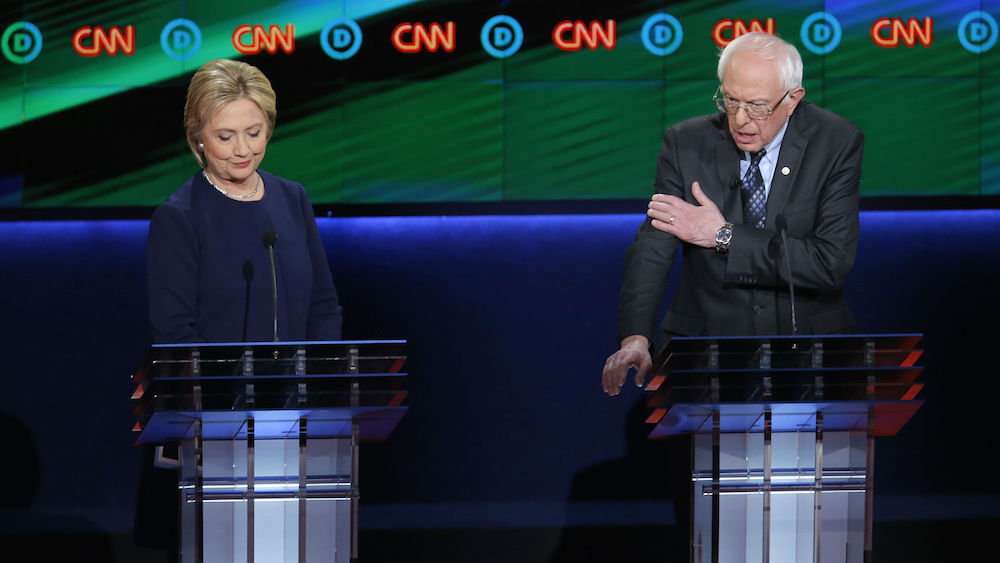Former Secretary of State Hillary Clinton has by far the most foreign policy expertise, but that hasn’t helped her in the race to become her party’s candidate for the presidency. And criticism of Donald Trump’s ideas on how to deal with the rest of the world have not hurt the real estate mogul’s own chances – yet.
Foreign policy issues usually play a subordinate role in the US primaries, and in 2016, topics like immigration, criminal justice, terrorism, income distribution, education, climate change, and health care have so far dominated the debates between the candidates. But the nearer the Democratic and Republican National Conventions draw, the more the would-be presidential candidates are scrutinized for their foreign policy expertise – or lack thereof.
Hillary Clinton is often regarded as the presidential candidate with the most foreign policy experience. She can easily comment on policy issues in the Middle East, East Asia, or Europe like no other candidate, and as former Secretary of State she maintains extensive networks in Washington institutions and think tanks. She recently used this home-field advantage to expose the lack of support among foreign policy experts for her Democratic rival, self-declared “democratic socialist” Vermont Senator Bernie Sanders. But to what extent would such an approach help Clinton in a direct contest with Donald Trump? Recently, Trump was sharply criticized by Republican foreign policy experts – but it has yet to have a harmful effect on his campaign.
Opposition to the Iraq War
For some time now, it has seemed that Clinton’s foreign policy expertise would not be an advantage to her candidacy. In fact, Sanders regularly criticizes her for supporting the Iraq invasion during her time as senator. Having voted against the war himself, Sanders argues that, in contrast to Clinton, he “got it right” when it came to the most important foreign policy issue of our time. In addition, Sanders regularly calls attention to Clinton’s role in the Libya intervention, which is widely held as one of the great missteps of the Obama Administration.
Sanders thus presents himself as the candidate who has always shown proper judgment on crucial foreign policy issues – the candidate who will eschew foreign policy entanglements with uncertain outcomes if elected president. Indeed, there are significant foreign policy differences between the Democratic candidates. While Clinton argues for a more pro-active US role in Syria – by establishing no-fly zones, for example – Sanders advocates more restraint in the use of American force. And while it is unlikely that Clinton will shrink the US military, Sanders advocates further cuts in defense spending in favor of “nation-building at home.”
However, when Sanders demanded that “we move as aggressively as we can to normalize relations with Iran” and advocated cooperation with Tehran, Riyadh, and Moscow in the fight against the so-called Islamic State, foreign policy experts close to Clinton questioned Sanders’ qualifications for the position of commander-in-chief. In an open letter, they warned that Sanders would jeopardize national security, while Clinton herself added that “there really isn’t any kind of foreign policy network that is supporting and advising Senator Sanders.” Indeed, as Politico pointed out, until recently Sanders has been unable to win over influential foreign policy experts for his team. And the closer Clinton comes to the nomination, the less inclined experts are to openly side with Sanders.
“Wildly Inconsistent”
On the Republican side, frontrunner Donald Trump often refers to his good judgment and confidently claims that he has a better understanding of foreign policy than his competitors. As part of this approach, he recently claimed to have vehemently criticized the invasion of Iraq in 2003 – though the accuracy of this claim is questionable. Trump advocates a more isolationist foreign policy, opposes free trade agreements like the Trans-Pacific Partnership (TTP), and demands compensation from allies like Japan and South Korea for US security guarantees. Aside from a former intelligence chief, Lieutenant General Michael Flynn, who argues in favor of close cooperation with Russia, Trump noticeably lacks prominent foreign policy advisors. Among his supporters, Trump’s “unorthodox” ideas – including his trademark policy of building a wall along the US-Mexican border and making “the Mexicans pay for it” – reinforce the impression that the real estate tycoon openly challenges the mindset of the Republican establishment.
In early March, more than a hundred conservative foreign policy experts signed their names to an open letter warning against a Trump nomination. Trump’s foreign policy vision, they claim, is “wildly inconsistent and unmoored in principle,” and his advocacy for trade wars is “a recipe for economic disaster.” International conflicts can not be resolved “as a real estate deal might,” the letter taunted. In addition, former CIA Director Michael Hayden warned that it is unlikely that US commanders would follow Trump’s orders should he try to implement his ideas on torturing terror suspects or killing their next-of-kin – practices that are clearly in violation of international law. So intense is the dislike of the Republican frontrunner in some branches of his own party that a number of conservatives have already stated that they would rather vote for Clinton. It remains to be seen if this harsh criticism could help stop Trump’s triumph.
An Unpleasant Rival
In a contest between Trump and Clinton, foreign policy is likely to become a fascinating subject, fed by the candidates’ mutually exclusive visions. Clinton asserts that Trump would pose a real threat to national security. “Our commander-in-chief has to be able to defend our country, not embarrass it,” Clinton told followers on March 15. “When he embraces torture, that doesn’t make him strong, it makes him wrong.” The risk is that Trump will continue to frame himself as the anti-establishment candidate who, unlike Clinton, deliberately ignores Washington elites and their alleged “expertise.” If he succeeds in doing so, Trump will pose more of a threat to the Clinton campaign than Bernie Sanders ever did.







